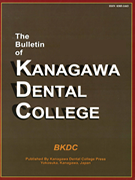- HOME
- > 一般の方
- > バックナンバー:The Bulletin of Kanagawa Dental College
- > 29巻2号
- > アブストラクト
アブストラクト(29巻2号:The Bulletin of Kanagawa Dental College)

English
| Title : | Occlusal Disharmony Modulates the Neural Activity of the Central Nervous System |
|---|---|
| Subtitle : | BKDC CLINICAL AND RESEARCH TOPICS : DAWN OF OCCLUSION - New Aspects of Masticatory Organ |
| Authors : | Noriyuki Yuyama |
| Authors(kana) : | |
| Organization : | Department of Oral physiology, Kanagawa Dental College |
| Journal : | The Bulletin of Kanagawa Dental College |
| Volume : | 29 |
| Number : | 2 |
| Page : | 143-147 |
| Year/Month : | 2001 / 9 |
| Article : | Report |
| Publisher : | Kanagawa Odontological Society |
| Abstract : | [Abstract] Occlusal disharmony may cause disability in multiple mental and physical behavior and in general health. Occlusal problems have been considered to induce bruxism or continuously aggravate the problem, and eventually entail temporomandibular dysfunction. They also alter the behavior of the autonomic nervous system and provoke emotional stress and sleep disorders. On the other hand, biochemical and electrophysiological studies have provide evidence for alterations in central processing by occlusal disharmonies. However, these physiological changes are not still well understood in light of the functions of the central nervous system. This article reviews the latest scientific information concerning the relationship between occlusal disharmony and the neural activity of the central nervous system. This review summarizes the provided evidence that modulation of central neurotransmission and neuroplasticity depend on the type of occlusal disharmony generated and on the period during which it is maintained. Dentists, therefore, must be aware that there are neurobiologic effects of dental proceedings that may have far-reaching effects on the central nervous system (CNS). |
| Practice : | Dentistry |
| Keywords : | Occlusal disharmony, Neurotransmission, Central nervous system, Neuroplasticity, Intracellular mechanisms |
